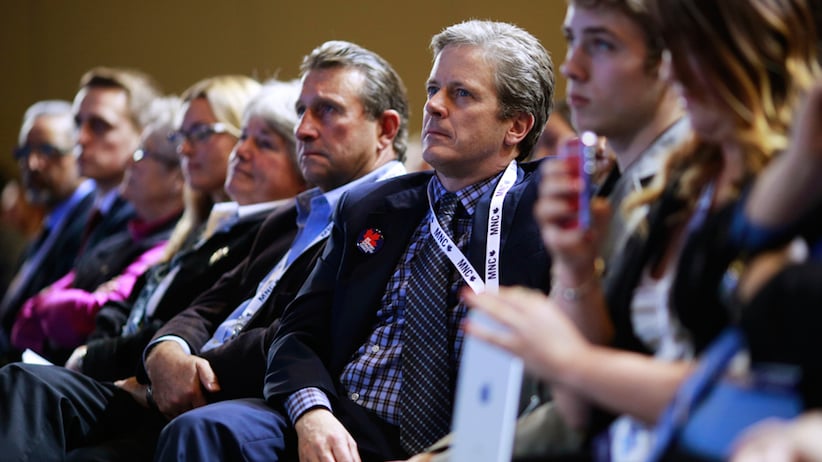The Conservatives’ weekend of discontent
Policy passions meet political calculations at the Manning networking conference
Tony Clement (C). Manning Networking Conference at the Ottawa Convention Centre in Ottawa February 28, 2014.
Share
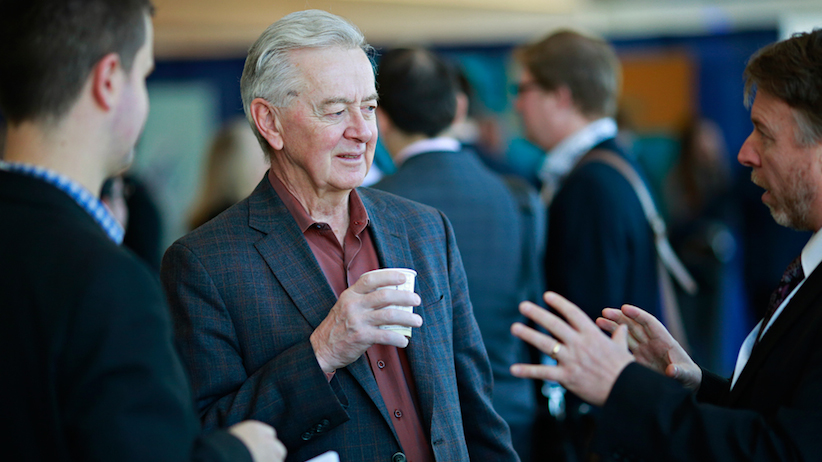
The organizers of the Manning Networking Conference like to describe the annual gathering of several hundred Canadian conservatives as a sort of policy symposium crossed with a political strategy session. It also has the unpredictable feel of a family reunion, with oldsters bumping up against kids and eccentric cousins in attendance.
There was a moment at last weekend’s sixth edition of the get-together, held at the Ottawa Convention Centre, when Mike Harris swept in, creating an audible, admiring buzz among those grey enough to remember his glory days as Ontario premier. But as Harris passed a booth distributing novelty buttons, he failed to turn the heads of a cluster of young right-wingers pressing in eagerly to pick up and pin on the most popular one, which featured the slogan, “I’d rather drink with Rob than smoke with Justin!”
That would be, of course, Rob Ford, the Toronto mayor whose conservative credentials ranking Conservatives at the conference weren’t eager to highlight. And, naturally, Justin Trudeau, the Liberal leader they all claimed not to be obsessing over, although the showcased speakers rarely passed on a chance to deride him from the podium. If Harris personifies the tradition they came to celebrate, Trudeau represents the current danger they face, while Ford reminds them that 2013 was an awful year for the Canadian right—and 2014, so far, doesn’t feel much better.
Preston Manning, the former Reform party leader whose Manning Centre for Building Democracy hosts the conference, cited a new poll showing that the Liberals have even jumped ahead of the Conservatives in the public’s assessment of economic competence. “We could get discouraged and down on ourselves and try to find someone to blame,” Manning said. “Or we can frankly and honestly face up to these political realities.”
It was easier to talk freely about distressing realities at this conference than it would have been at any official Conservative convention. Even though most of the big names it showcased were paid-up partisans—including a raft of provincial leaders and federal cabinet ministers—Manning’s Calgary-based centre is independent. He founded it in 2005, after exiting federal politics. Don Abelson, a University of Western Ontario political science professor who studies U.S. and Canadian think tanks, says Manning “borrows from the playbook of the Heritage Foundation,” the enduringly influential U.S. right-wing group, founded in 1973, which funnels policy ideas to elected Republicans, while also helping train young American conservatives in the political arts.
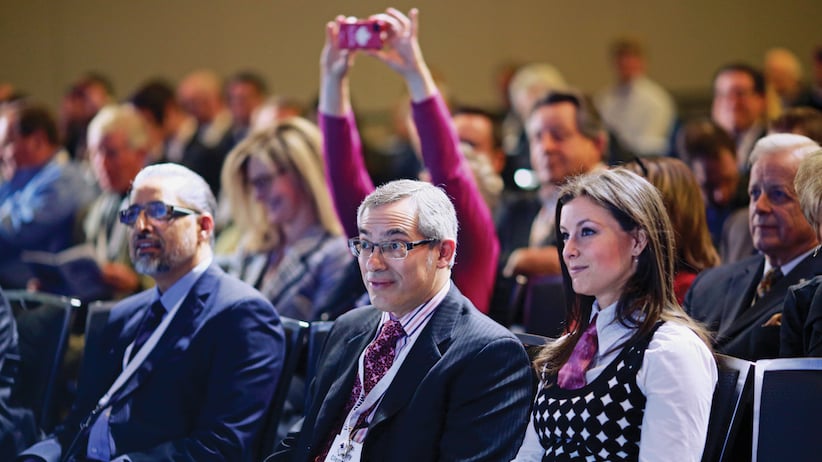
Canadian conservatives rubbed elbows at the Manning conference in all their disparate, sometimes discordant, diversity. Since it was, at root, Manning’s show, Prairie-populist one-time Reformers were thick on the floor. But veterans of Harris’s 1995-2002 Ontario Conservative government, elected on the “Common Sense Revolution” tax-cutting blueprint, also abounded. Religious conservatives could drop by the hospitality room of Cardus, a think tank “drawing on 2,000 years of Christian social thought.” Occasionally, there was even a glimpse of an old-school, corner-office, blue-chip Tory, such as former Harper cabinet minister Jim Prentice, now a CIBC executive vice-president. There was also a guy in a huge cowboy hat.
In the Ottawa of Stephen Harper’s formidable message discipline, the message permissiveness here felt like a powerful muscle relaxant injected into the conservative bloodstream. Yet the conference wasn’t entirely unscripted: Rallying the movement was the shaping objective.
To that end, Saskatchewan Premier Brad Wall was slotted as the first speaker. In his province’s 2011 election, Wall’s right-leaning Saskatchewan Party took a crushing 64 per cent of the popular vote—an intoxicating number for federal Conservatives now slumped to below half that level in national polls. He’s not above gimmicks. Wall interrupted his speech to show a video of Canada’s Olympic women’s hockey team singing O Canada after winning gold at Sochi. For contrast, he took aim at Margaret Atwood, cast as the archetypal left-wing Torontonian sophisticate, lambasted for her tweet, “ ‘Own the podium’ too brash & aggressive 4 Candns. I proposed ‘A podium might be nice.’ ” Wall didn’t seem to grasp the novelist’s brand of humour.
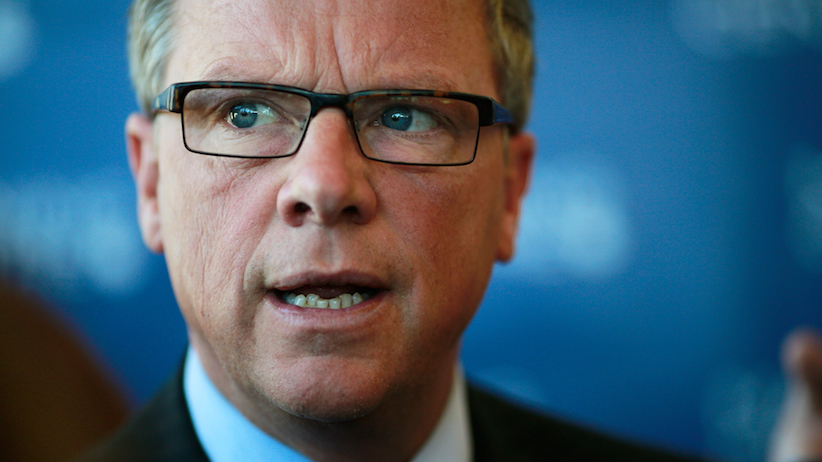
His more serious message was mainly about the prospects for the Canadian natural resource and agriculture sectors. Wall set up a culture clash over the economy’s future: Conservatives want Canada to get rich from selling food, oil and minerals, while New Democrats and Liberals begrudge that success. This way of framing the economic policy debate—Conservatives for natural resource riches, Liberals and NDP against—was echoed many times at the conference.
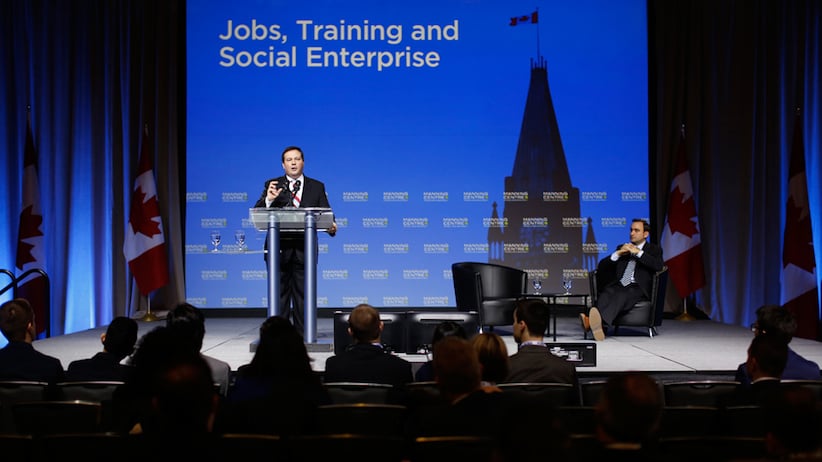
“What is wrong with the Canadian left,” asked Employment Minister Jason Kenney, “that they would rather have Canadians, in many cases, unemployed and underemployed, without a future, than actually be able to, in an environmentally responsible way, harvest our natural resources?” Kenney played to the pride of those who hail from resource-rich regions, notably his Alberta home turf. “These are not unsophisticated industries. These are industries that require the greatest application of human ingenuity in economic history.”
That went over big in a room that identified with oil and gas, mining and farming. But the Manning conference crowd is hardly a close proxy for the voting public. It’s not obvious how fierce advocacy for resource industries can form the basis of a Conservative platform with any hope of selling well where political strategists see the most ridings in play for the 2015 federal election, notably the suburbs around Toronto and Vancouver. Kenney and others touted the spinoffs from massive resource development for the rest of the Canadian economy, in everything from construction to services. It didn’t make trying to persuade voters in, for instance, Mississauga, Ont., to get excited about, let’s say, fracking for natural gas in northern B.C., seem a less daunting campaign challenge.
A more promising approach might be to take on Trudeau over his claims about middle-class Canadians being left behind. Trudeau’s case rests on statistics that show little improvement for those at the midpoint between the richest and poorest over the past three decades. Some economists see a sort of middle-class stagnation, but others point out that, since the mid-1990s, median after-tax incomes have, in fact, been climbing.
Former Harper cabinet minister Chuck Strahl, the Manning Centre’s chairman, said federal Conservatives should adopt Wall’s upbeat tone to counter Trudeau’s dire warnings. “Brad said you should be proud of the country; you’ve got a great thing going, as opposed to a message that says, ‘You should be alarmed; the middle class is disappearing.’ ”
For Harper to position himself as the sunny optimist, though, and cast Trudeau as the fear-mongering pessimist, would require upending the conventional view of their political personas. In fact, there’s nothing in the Conservative record of recent years that suggests they would ever run without setting up targets to attack. One politically promising adversary: public sector unions. Recent federal government moves on that front include eliminating home mail delivery, setting up a fight with the postal union, and forcing retired federal bureaucrats to pay more for their health benefits, which has alarmed the Public Service Alliance of Canada.
Treasury Board Secretary Tony Clement, who spoke to youth activists at the conference, is Harper’s point man in the battle against the unions. “The union movement, which used to be a progressive force in society—I’m talking about the public sector union movement now—has become a voice of status quo and protecting its own perks and interests,” Clement said in an interview. “It’s no longer a progressive movement. We’re being progressive in trying to think of ways to deliver excellent service to Canadians at a lower, sustainable cost. That’s going to be part of Conservatism, too.”
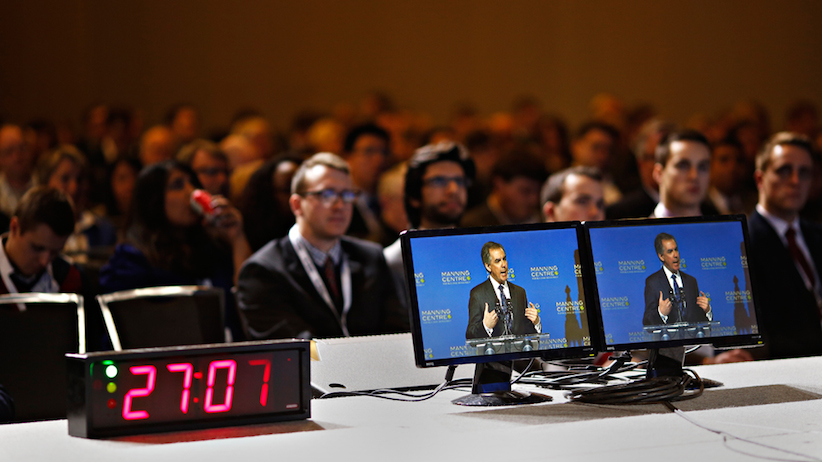
Squaring off against unions was one of the red-meat issues where establishment Conservatives shared common ground with the small-c conservative activists who swarmed to the conference. Other themes that resonated with true believers in the crowd don’t dovetail so neatly with election strategy. Take the Hamilton-based Cardus Centre, which had a big conference presence. Kenney singled out a Cardus economic report for praise in his speech. But the group also continues to push for policies like support for religious private schools—even though that position proved disastrous for Ontario Tories in the province’s 2007 election. “Why can’t we have this conversation?” said Cardus president Michael Van Pelt. “We’re not political parties; we’re think tanks.”
It’s these collisions between conservative policy passions and Conservative political calculations that can make the Manning conference fascinating. Danielle Smith has had to think about that tension a lot since her Wildrose party lost Alberta’s 2012 provincial election to the more centrist Progressive Conservatives. Last fall, a Wildrose policy convention for the first time acknowledged the need to curb greenhouse gas emissions. They softened other stances, such as switching from a pledge to scrap the Alberta Human Rights Commission to merely vowing to make it fairer. “You do start with advocacy issues, the kinds of issues people take on as a cause,” Smith told Maclean’s. “As you start building your coalition, going further and further to capture a broader number of voters, you have to start looking at the issues that resonate with a majority of people.”
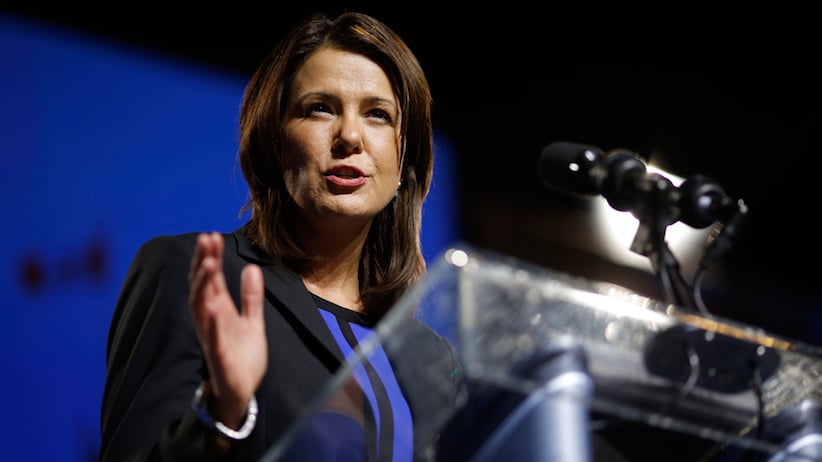
When it comes to figuring out how issues resonate, the Manning Centre turns to pollster André Turcotte, a Carleton University professor with long-standing ties to Preston Manning. For five years running, Turcotte has presented his “Manning Barometer” poll at the conference. In the past, he often brought welcome news. But his 2014 findings were ominous. “Usually, when I present data to my clients and the data isn’t always positive, I say, ‘Don’t shoot the messenger,’ ” Turcotte said at the start of his presentation. “With most audiences, I mean that as a figure of speech. But this is the conservative movement, so I mean it literally.”
Among his main findings: Thirty-one per cent of Canadians he surveyed identified with the Liberal party, up from 26 per cent a year ago, while 26 per cent felt closest to the Conservative party, almost unchanged in a year, and 18 per cent with the NDP, also about the same as a year before. But those figures on party affinities tend to disguise even bigger Liberal gains in B.C. and Ontario, those key federal election battlegrounds. Even harder for Conservatives to hear, Turcotte told them Trudeau’s Liberals have jumped ahead of them in the public’s view of which party would best manage the economy—long regarded as Harper’s strongest suit.
And Turcotte’s analysis of which issues just don’t click seemed to clash with some favourite messages of Manning conference speakers. He said most Canadians—even those who identify with the Conservative party—are unimpressed by politicians who make a big deal of marijuana policy, whether for legalization (like Trudeau) or against (like Harper). He also said creating high-quality jobs in the energy industry is a policy aim that fails to engage most voters. Among more promising issues that Tories should focus on in their bid to regain support, he said, are ideas for helping an aging population and improving government accountability.
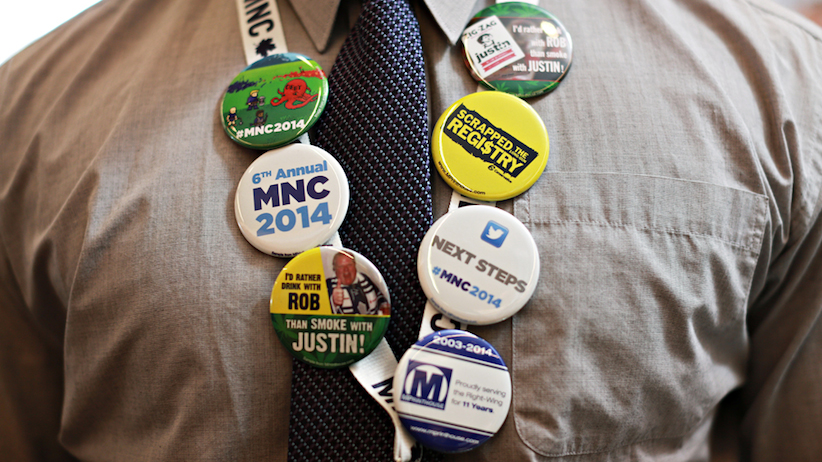
Turcotte advised Conservatives to rethink their own message, and not just blame Trudeaumania redux. Manning—the paterfamilias of the movement, as Kenney called him—used his main speech to urge the party faithful to take a close look at Turcotte’s analysis. In the end, though, Manning couldn’t resist feeding the crowd’s hunger for yet another disdainful attack on what they dismiss as the fluffy foundation for Trudeau’s rise to the top of the polls. “Let us vigorously make the case,” he said. “You can’t eat charisma. You can’t wear charisma. You can’t pay the mortgage with charisma. You can’t put charisma in the bank.”
As his conference wrapped up, however, and Canada’s most dedicated right-wingers dispersed for another year, some of them had to be wondering if, for all charisma’s limitations, one thing it might be good for is winning elections.
